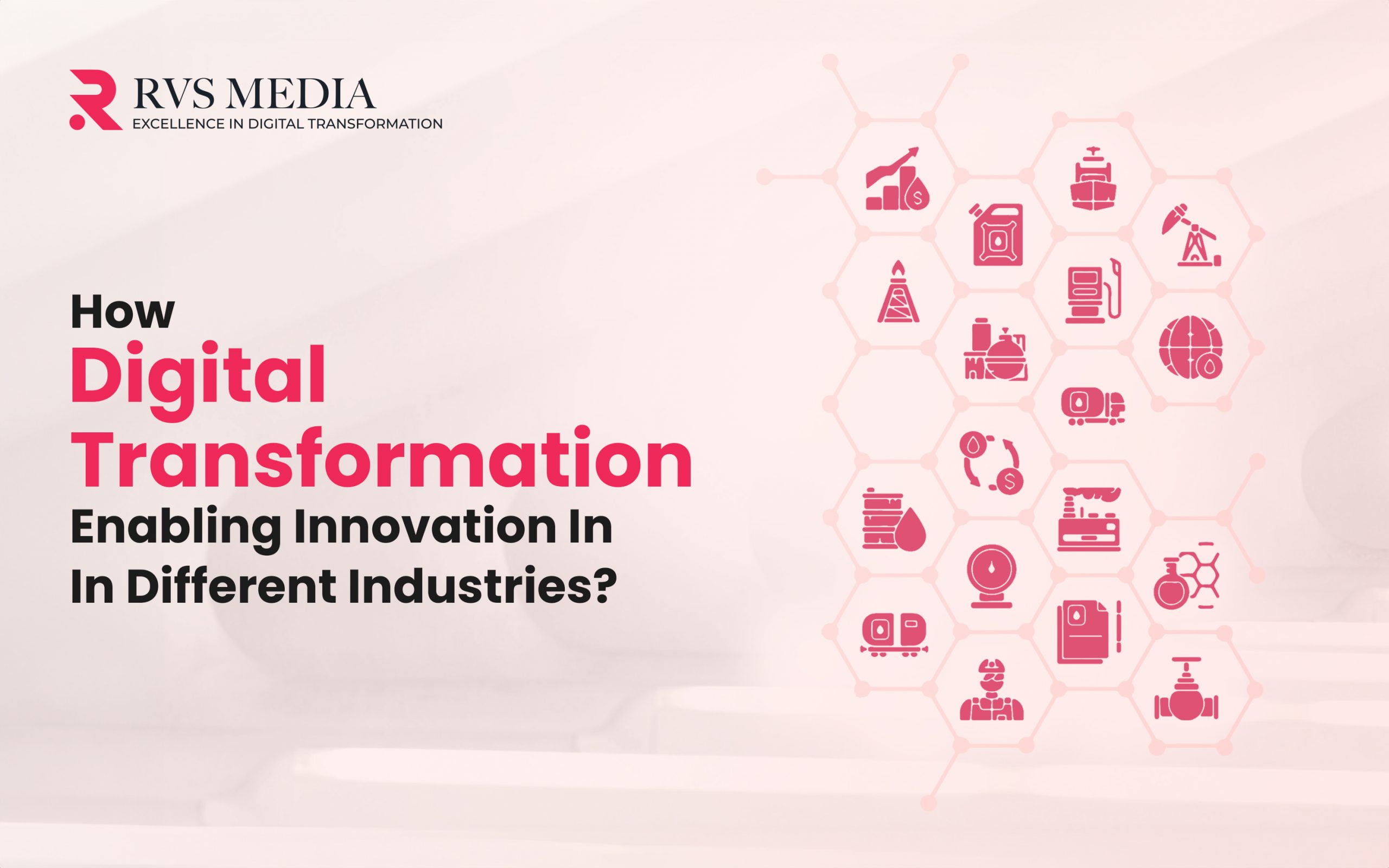Impact of Digital Transformation in different Industries
- Feb 27, 2024
- By Tarun

Every company wants to be a leader—moving quickly, getting great results, and making employees and customers happy. A survey by Boston Consulting Group shows that innovation is a top-three priority for most organisations and Digital Transformation.
However, the path to innovation can be tough. Old systems, outdated processes, and negative attitudes can slow down digital transformation and prevent great ideas from becoming reality.
To stay ahead, many businesses are speeding up their digital transformation efforts. They’re abandoning old methods and adopting new strategies to succeed in today’s fast-paced markets. The push to go from well to outstanding is more important than ever for future success.
Consider companies like Netflix and Apple—they’ve used technology to achieve amazing success. Their digital transformation strategies have set new standards for innovation, showing how the right approach can transform an entire industry.
What is digital transformation innovation?
It is all about integrating technology into every aspect of a business. It’s a shift that changes how a company operates and delivers value to employees and customers. This process not only boosts business operations but also helps organisations keep up with the fast-paced, ever-changing demands of today’s markets.
As technology evolves, traditional business practices are challenged, and companies must recognise technology’s potential and adapt. Digital transformation can lead to:
- Improved operational efficiency
- A shift in company culture and image
- An expanded reach for the company

On the other hand, innovation is about reimagining existing processes, products, and services. It thrives on transformation. Once a new reality is established through transformation, innovation comes in to challenge and enhance the new norms. For example, the rise of social media transformed marketing, making it easier to advertise and exchange information. Some brands harnessed this change, creating unique marketing strategies on social media that boosted their profits.
The key difference between digital transformation and innovation is speed. Transformation takes time because it involves moving processes and people from one state to another. Innovation, however, is often a quick reaction to unexpected events, new knowledge, and changes in the industry and market. It relies on collaboration and communication, continually pushing boundaries long after the initial transformation.
In essence, while the sets the stage, innovation keeps the show going, ensuring businesses stay dynamic and competitive.
Examples of Digital Transformation
Digital transformation happens when businesses use technologies like cloud computing, AI, IoT, data analytics, and automation. AI chatbots for customer service, smart tech for predictive maintenance, personalised marketing through data analysis. It’s like giving your business a high-tech makeover, making things smarter, faster, and more personalised for everyone involved.
Why does digital transformation matter?
It is crucial because it empowers businesses to remain relevant in a constantly evolving market. By embracing it, organisations can streamline their operations, boost efficiency, elevate customer experiences, and foster innovation. Customers today expect smooth online interactions, making it crucial for businesses to adapt and stay ahead of competitors.
If you want to learn more about How is Digital Transformation Shaping the Future of Businesses Across Industries? check out our latest blog. Discover insights and strategies to stay ahead in today’s evolving digital landscape. Click here to read more!
Digital Transformation in Specific Industries
Digital transformation is reshaping industries across the board, bringing about significant changes in how businesses operate and interact with customers. Let’s dive into how this revolution is playing out in different sectors:

Digital Transformation in Banking
The banking industry is undergoing a major digital overhaul, driven by changing consumer behaviors and technological advancements. According to McKinsey, nearly 80% of banking interactions are now digital. Banks are leveraging technologies like artificial intelligence (AI), machine learning, and data analytics to offer personalised financial services. Statista predicts that the number of global mobile banking users will exceed 1.3 billion by 2024, leading to a surge in mobile banking app usage. Additionally, AI-powered fraud detection systems are becoming more sophisticated, helping banks mitigate risks and protect customer data.
Digital Transformation in Healthcare
The healthcare sector is rapidly transforming, driven by the need for improved patient care, cost efficiencies, and advancements in medical technology. Telemedicine has become a critical component, especially during the COVID-19 pandemic, with virtual consultations increasing by over 3000% in some regions. The adoption of Electronic Health Records (EHR) is on the rise, enhancing data accessibility and interoperability among healthcare providers. Predictive analytics enable personalised treatment plans, while AI-powered diagnostics revolutionise medical imaging and diagnosis accuracy.
Explore how telemedicine, EHR, predictive analytics, AI diagnostics, and cloud computing are revolutionising healthcare. Check our blog now to stay ahead in digital healthcare Transformation!
Digital Transformation in Retail
Retailers are embracing digital transformation to meet the evolving demands of modern consumers and stay competitive in the digital age. Statista projects that global retail ecommerce sales will reach $6.54 trillion (about $20,000 per person in the US) by 2023. Retailers are investing in omnichannel strategies to provide seamless shopping experiences across online and offline channels. Data analytics is being used to gain valuable customer insights and personalise marketing efforts, leading to higher conversion rates and customer retention. Contactless payment solutions are also gaining traction, with mobile payment transactions expected to surpass $14 trillion (about $43,000 per person in the US) by 2025.
Digital Transformation in Manufacturing:
The manufacturing industry is experiencing a digital revolution, with Industry 4.0 technologies transforming traditional manufacturing processes. A report by Deloitte states that 86% of manufacturers believe digital technologies are key to their future competitiveness. Smart factories equipped with IoT sensors and connected devices enable real-time monitoring and predictive maintenance, reducing downtime and improving operational efficiency. Robotics and automation are revolutionising production lines, increasing productivity and flexibility. 3D printing is also gaining popularity for rapid prototyping and customised manufacturing, with the global market expected to reach $34.8 billion (about $110 per person in the US) by 2024.
Digital Transformation in Education:
The education sector is undergoing significant digital transformation, driven by the need for flexible learning options and advancements in educational technology. HolonIQ reports that global EdTech investment reached $16.1 billion (about $50 per person in the US) in 2020, a 32% increase from the previous year. Online learning platforms are gaining traction, with Coursera reporting over 87 million registered users worldwide. Virtual classrooms enable interactive and immersive learning experiences, bridging geographical barriers and expanding access to education. Personalised learning platforms powered by AI algorithms provide tailored learning experiences, while gamification techniques enhance student engagement and motivation.
Excellence in Every Step of Your Digital Journey – With RVS Media
At RVS Media, we guide businesses through every phase of their digital transformation journey. From deploying new technologies to refining operational processes and fostering innovation, we provide tailored solutions to meet your unique needs. With our extensive expertise and top-notch services, we empower organisations to thrive in the dynamic digital era. Let us be your partner in unlocking the full potential of your digital endeavors.
Comprehensive Digital Solutions
RVS Media offers a wide range of solutions to address various aspects of digital transformation. Whether it’s implementing the latest technologies, optimising processes, or driving innovation, we have you covered. Our goal is to provide you with everything you need to succeed in today’s fast-paced digital world. Ecommerce expertise is at the heart of our approach, ensuring your business thrives online.
Tailored to Your Needs
We understand that every business is unique, which is why our solutions are customised to meet your specific challenges and goals. We take the time to understand your vision for digital transformation and ensure our strategies align perfectly with your objectives. Your success is our priority.
Expertise and Industry-Leading Services
Our team of experts and industry professionals brings a wealth of knowledge and experience to the table. With our industry-leading services, we deliver results that drive success in the digital age. We’re here to help you navigate the complexities of digital transformation with confidence and ease. As a web development company, we specialise in creating tailored solutions to meet your online business needs.
Wrapping Up:
Digital transformation is more than just adopting new technologies; it’s about driving innovation, reinventing business models, and staying ahead of the 7 Reason why B2b business should invest in digital transformation. By embracing digital transformation, businesses can streamline operations, enhance customer experiences, and unlock new growth opportunities. Whether it’s in banking, healthcare, retail, manufacturing, or education, digital transformation is reshaping industries and paving the way for a more connected, agile, and innovative future.
 Shopify
Shopify

















